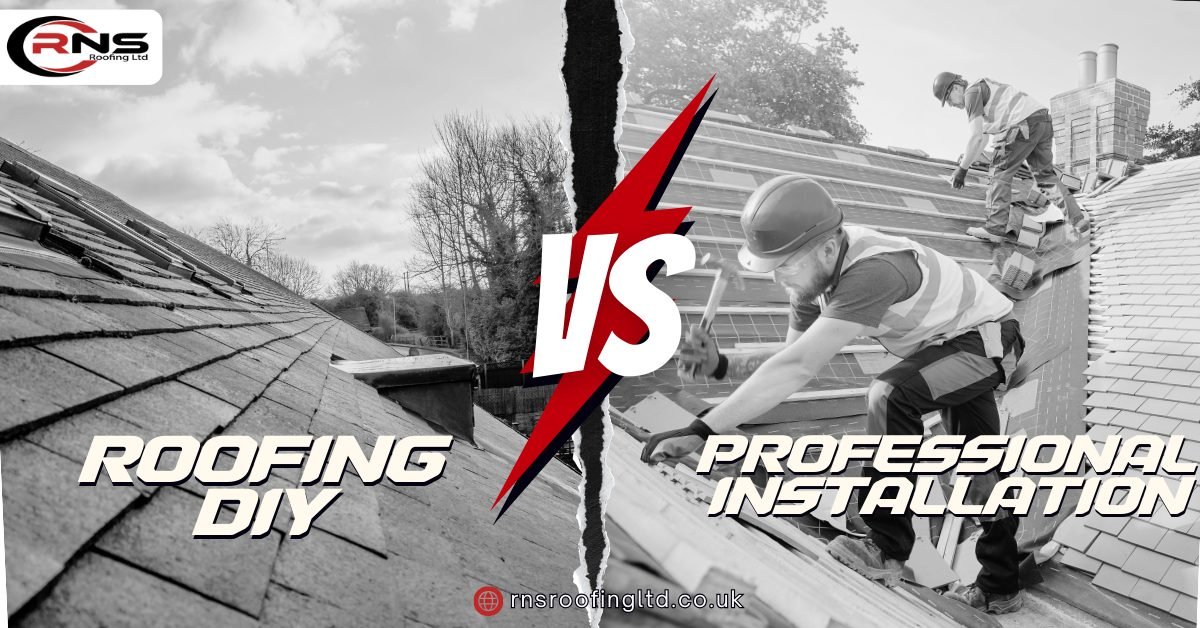So your roof is on its last legs and you need a Roof replacement. As a handy homeowner, your first instinct may be to take on the project yourself to save some cash. After all, how hard can it be to install some shingles? Before you grab your hammer and start tearing off the old roof, it’s worth weighing the pros and cons of a DIY roofing Vs hiring a professional roofer.
A new roof is a big investment, and while a DIY approach may seem tempting, there are some significant downsides to consider regarding cost, time, safety, and the quality of the finished result. As the saying goes, sometimes you get what you pay for. In this article, you will get detailed information about Roofing DIY vs. professional installation.
DIY Roofing
The Potential Cost Savings of DIY Roof Installation
A DIY roof installation can save you a bundle compared to hiring a professional. Materials for an average roof can cost between $5,000 to $10,000, but paying a contractor to install it can double that price. A DIY roofing project may be tempting if you’re handy and not afraid of heights. But before you grab your hammer, consider the potential downsides.
Costs Can Quickly Add Up
Sure, you’ll save on labour, but you still have to pay for shingles, felt or synthetic underlayment, nails, and roof cement or caulk. And don’t forget essential safety gear like work boots, gloves, eye protection, and roof jacks or harnesses. Renting equipment like ladders, lifts or dumpsters can also increase your out-of-pocket costs.
It’s Dangerous Work
Falling from a roof can lead to serious injury or death. Roofing also requires working in extreme heat and handling heavy materials and equipment. If you don’t have experience, you risk making dangerous mistakes or improper installations that could void your shingle warranty.
Permits May Be Required
Many areas require permits for roof replacements, especially if you change the roofline or materials. Permits often involve inspections and work without proper permits can lead to fines.
While a DIY roofing project can save money, the risks far outweigh the rewards for most homeowners. Unless you have roofing experience, it’s best left to the professionals. Your life, home, and wallet will thank you.

The Risks and Challenges of DIY Roofing
DIY roof installation may seem like an easy way to save money, but it comes with some serious risks and challenges.
Safety Hazards
Climbing up on a roof and performing construction work at heights can be extremely dangerous if you’re not experienced. You could easily slip and fall, or drop heavy materials. Is saving a few bucks worth risking life and limb?
Lack of Knowledge
Do you really know how to install or repair a roof properly? There’s a lot more to it than just hammering in some shingles. Things like roof pitch, ventilation, and flashing all require expertise to get right. An amateur job may seem fine initially, but problems could appear down the road costing you more in the long run.
Time and Effort
Putting on a new roof or making repairs is difficult, labour-intensive work, especially if you’re not used to construction. It can take days or weeks of hard labour to complete, all while up on a hot roof in the elements. For most homeowners, taking that much time off work is unrealistic.
Cost Savings May Be Negligible
While the DIY approach saves on labour costs, you still have to pay for quality roofing materials, tools, and equipment. By the time you add up all the expenses, the cost difference may be smaller than you expect. Is it really worth the significant risks and downsides to save only a few hundred dollars?
For most homeowners, leaving roof installation to the professionals is the smarter choice. Your safety, peace of mind, and quality of work are worth the investment. Why gamble when you can rely on experienced roofers to do the job right?
Benefits Of Hiring a Professional Roofing Contractor
Hiring a professional roofer to install or replace your roof has significant benefits over attempting a DIY roofing project.
Experience and expertise
Professional roofers have the proper training, experience, and expertise to handle all aspects of a roof installation safely and correctly. They are up to date with the latest building codes and safety standards to ensure your roof is secure and watertight for years to come. DIY roofing can be extremely dangerous if you’re not highly experienced, and the results are often subpar.
Higher quality materials
Reputable roofing companies can access high-quality, durable roofing materials that may not be available to homeowners. They can also get contractor discounts that they pass on to customers. Professionals also know the pros and cons of different roof types, brands, and materials to determine what’s most suitable and budget-friendly for your home’s needs.
Permits and inspections
Professional roofers will handle obtaining any necessary permits before starting work on your roof. They will also schedule any required inspections by your local building department to ensure the work is up to code. This protects homeowners and gives them peace of mind that the job was done properly according to regulations.
Warranties and guarantees
Most professional roofers will provide strong workmanship warranties and pass on the manufacturer’s warranties for materials. This means if there are any issues with leaks, damage, or defects within a certain time period, the roofer is responsible for repairs at no cost. DIY roofing voids most manufacturers’ warranties and provides no guarantees.
Clean up
Reputable roofing contractors will do a thorough job of cleaning up after the installation is complete, hauling away any debris, nails, or scraps from your property. They have an efficient system for collecting and removing waste that prevents a mess in your yard. With a DIY roof, you’re stuck handling the cleanup yourself which often takes a lot of time and effort.
For most homeowners, the pros of hiring a professional roofer far outweigh the potential cost savings of a DIY roof installation. Your roof is too critical a component of your home to cut corners, and professionals have the skills and resources to do the job right.
Tips for Deciding Between DIY vs. Professional Roof Installation
When it comes to installing a new roof, you have two options: do it yourself or hire a professional. There are pros and cons to both, so consider your skills, time, and budget to determine the best choice for your needs.
DIY Pros
- Save money. DIY roof installation can save you thousands versus hiring pros.
- Gain experience. You’ll learn new skills that could be useful for future home repairs.
DIY Cons
- Safety risks. Roofing can be dangerous if you’re inexperienced. You could fall or drop heavy materials.
- Time-consuming. A DIY roof installation typically takes many weeks of work, often on weekends and evenings after your day job.
- Imperfect results. If you’re not highly skilled, the finished roof may not look or function as well as a pro job.
Professional Pros
- Higher quality. Professionals have the proper training, tools, and experience to do the job well.
- Safer. Reputable roofing companies follow all safety standards to prevent injury.
-Faster. Pros can typically install an entire residential roof in a few days since they work on roofs daily.
-Warranties. Professional installers often provide material and labour warranties for your new roof.
Professional Cons
- Higher cost. Paying a professional crew to install your roof will be significantly more expensive than a DIY job.
Tips for Deciding
- Consider your roofing skills and experience. If you’re not highly skilled, a pro is probably better.
- Calculate the total cost of a DIY roof including materials, equipment rental, and your time. Compare to pro estimates.
- Consider how long a DIY job will take and if you want to devote that much time.
- Get multiple estimates from reputable local roofing companies. Compare to your DIY budget.
- Compromise by having a pro install and you do minor follow-up work like flashing or drip edges to save a bit.
In the end, weigh all these factors carefully for your situation. While a DIY roof installation may be tempting to save money, a professional job is often safer, faster, and of higher quality. If you do choose to DIY, take it slow and put safety first.
Conclusion
So there you have it, the pros and cons of tackling a DIY roof installation yourself versus hiring a professional roofing company to do it for you. At the end of the day, you have to weigh all these factors and determine what makes the most sense for your particular situation. You can save thousands if you have the skills, time, patience, and budget to do it yourself. But if the thought of braving dangerous heights and ensuring a watertight result seems daunting, hiring a pro is probably your best bet. The most important thing is that you end up with a roof over your head that you feel confident in and can trust to protect your home for years to come. Whatever route you choose, make sure to do your research, follow the proper safety precautions, and don’t cut any corners. Your roof is worth the investment.
People Ask Questions About Roofing DIY Vs Professional Installation
Is DIY roofing a viable option for all homeowners?
DIY roofing can be suitable for individuals with adequate skills, knowledge, and tools. However, it may not be advisable for complex or large-scale roofing projects.
What are the drawbacks of DIY roofing?
Lack of expertise can lead to subpar workmanship, potential safety hazards, and costly mistakes. Warranty and insurance issues may also arise if problems occur later.
What safety precautions should I take for DIY roofing?
Prioritize safety by using appropriate personal protective equipment (PPE), securing ladders, and following safety guidelines for working at heights. Always work with a partner if possible.
What are the advantages of DIY roofing?
DIY roofing can save money on labor costs and allow for a sense of accomplishment. It also offers more control over the project timeline and materials selection.

